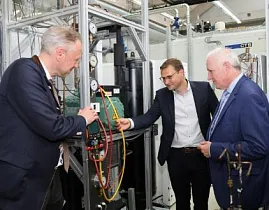
REFCOM are proud to be supporters of the “coolest” day of year which is on 26 June. This is when individuals, governments, organisations and companies worldwide celebrate World Refrigeration Day.
World Refrigeration Day raises awareness and understanding of the significant role that the refrigeration, air-conditioning and heat-pump industry and its technology play in modern life. The science, engineering, and application of cooling touches our lives in many ways, making hot climates habitable, allowing for storage and delivery of fresh food, giving us productive work and learning spaces, enabling the manufacture of products and the operation of data centres in thermally controlled environments, and preserving medicines and other essentials for healthy living. June 26th is the birth date of Lord Kelvin, after whom the absolute temperature scale is named.
"As the UK's leading F-Gas register, we are delighted to support this important day for our sector and to have been involved from the start. This year with COVID-19, celebrations have certainly had to be different, but despite restrictions we are still managing to raise awareness. Earlier this week we held an online webinar for our members and the wider UK sector. If yo missed it you can watch it on demand here."
“World Refrigeration Day is an opportunity to celebrate the wide range of temperature applications from cryogenics and superconductors through to sustainable heating, thermal energy storage and heat recovery,” said Steve Gill, Head of WRD Secretariat.
“The inaugural World Refrigeration Day in June 2019 was a monumental success,” Gill said. “More than 800 physical events in at least 153 countries were held last year along with numerous online activities.”
The theme chosen for World Refrigeration Day in 2020 celebrates the importance of the food cold chain in sustaining life. The cold chain links producers and growers across the world to the domestic refrigerator in our kitchens, and it is essential for so much more than food. Vaccines must remain chilled until they are used by medical professionals around the world, and the cold chain is essential for blood transfusions and organ donor transport and storage.
The organisers of the ColdChain4Life campaign are the UN Environment Programme (UNEP), ASHRAE, European Partnership for Energy and Environment (EPEE), International Institute of Refrigeration (IIR), and the WRD Secretariat.
“World Refrigeration Day is a great opportunity for all of us to celebrate the tremendous contribution that refrigeration and air conditioning makes to our societies. This includes enabling our agricultural and food systems to harvest, store, transport and sell the foods that nourish us all. The cold chain is what makes this possible," said James Curlin, Acting Head of UNEP OzonAction. "We encourage everyone to organise their own national or local World Refrigeration Day celebrations on 26 June to shine light on great work of the refrigeration and air conditioning sector, which is so vital for the success of the Montreal Protocol.”
Darryl K. Boyce, P.Eng. ASHRAE President, said, “We are proud to partner with other global organisations to support World Refrigeration Day in this its second year as we celebrate refrigeration’s vital role to the modern world.”
“Our sector is essential for our health, for our productivity, for our wellbeing. And it does not stop there. Cooling can play a major role to support the decarbonisation of our economy by ensuring energy savings and supporting the shift to renewable energies, for example, with solutions such as heat recovery, thermal storage and demand response,” said Andrea Voigt, EPEE Director General.
Our food supply relies on a seamless ‘cold chain’ of refrigerated warehouses and vehicles that stretch from the farm or sea to the supermarket display cabinet. “Reducing food losses is one of the most important challenges concerning food security in the future as well as reducing global warming,” said Didier Coulomb, Director General of IIR. “Building good cold chains worldwide is the best answer.” According to the IIR, around 475 million tonnes of lost food could be saved every year which could feed 950 million people a year. Cold chains are also vital for the safe supply of vaccines and medicines as well as for healthcare applications.
Among activities planned by the organisers are a free webinar on 26 June presenting an opportunity to reach out to the public, government, and end users describing the value of the cold chain. The aim of the webinar along with development of ColdChain4Life promotional materials is to motivate adoption of best practices that minimise food waste and loss in the supply chain process, stimulate wise technology selections, and enhance operations for minimising leakage of refrigerants and maximising energy efficiency.
All professionals in the cooling sector and users of refrigeration technology are invited to support World Refrigeration Day and promote the ColdChain4Life campaign. To date, more than 300 companies and professional, scientific, and trade associations are supporters, and the number is growing.
To be involved or share ideas for initiatives visit www.worldrefrigerationday.org. Connect with the cold chain campaign at #COLDCHAIN4LIFE and with World Refrigeration Day at #WREFD20.